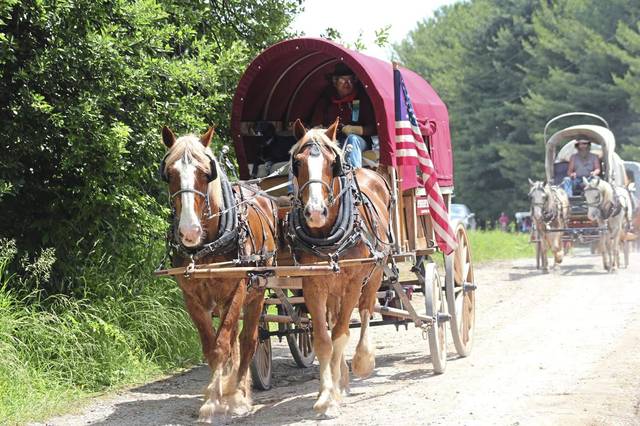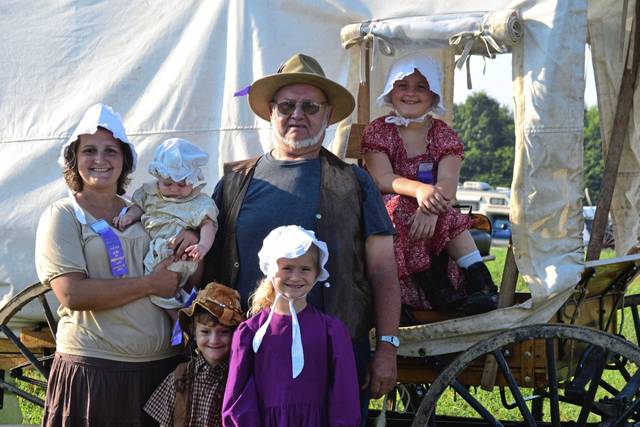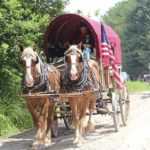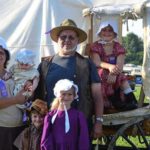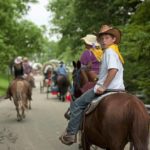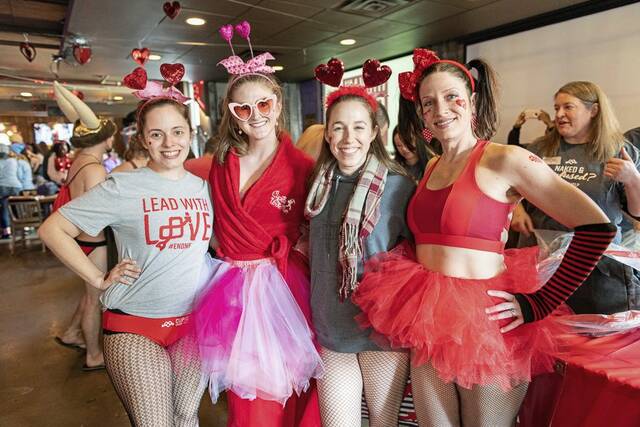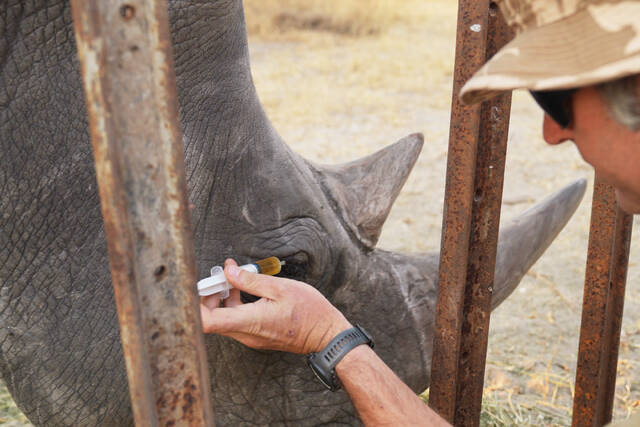An appreciation for life at 3 mph, an opportunity for children to play sans devices and reconnecting with friends who have become family all factor into participation in the annual Appalachian Wagon Train.
This year’s trek will begin, as always, on Father’s Day. Up to 25 wagons and 150 people are expected to travel nearly 90 miles of Westmoreland and Fayette county roads between June 16-22.
Those riding on horseback, in wagons or spending their days at the camp sites also will mark the wagon train’s 50th anniversary.
Using horse- or mule-drawn steel-wheeled wagons, the participants dress in period-appropriate clothing. Cresting a hill or clopping along a highway, they appear to channel the western side of the Keystone state circa the 1700-1800s.
A slower pace
Dick Stewart, 63, of Dayton, Armstrong County, is gearing up for his 18th wagon train.
“My family has had horses all of our lives. I knew about the wagon train forever. I always thought, ‘One of these days,’ ” he says.
Now he is its president, a role he’s held several times.
When he first saddled up, membership was about 400. It’s closer to 150 now, he says. Many treks include generations of families.
“If you’re not into horses, it’s not for you,” Stewart says.
A self-described workhorse who runs a farm and several businesses and is a volunteer firefighter, he says he “finally found something I like better than my work.”
“The wagon train slows life down to 3 mph for a week,” he says.
One can see more of the journey at that pace, Stewart says — foundations of old homes or trees one never previously noticed.
After a day on the road, riders enjoy pig roasts and cookouts, ice cream and each other’s company.
Train history
According to wagon train history, the first trek took place in 1970 to commemorate the 175th anniversary of the founding of Somerset County.
Local residents often watch the train pass by (route information is on the organization’s website). Visitors also are welcome at the campsites, where they can talk with the riders and purchase souvenirs.
“You might see the same people two or three times a day,” Stewart says.
The trips have not been without incident, he says.
“People have been thrown from horses, wagons have been upset. Last year, in front of a winery, a team got stung by bees. Nuts ain’t the word,” he says, laughing.
Luckily, the experienced driver was able to bring the horses around, Stewart adds.
“It’s the same as what pioneers got into back in the day. … Anything can happen,” he says.
Family affair
Kristie McVicker, 49, of Morgantown, W.Va., went on her first wagon train at age 2.
“I missed a few in college and when my kids were young. I’ve been on at least the last 20 trips,” she says.
Her grandfather, she says, had horses and went on one of the first wagon trains.
“People are there I’ve known for as long as I can remember. It’s very much like old home week,” McVicker says.
“I actually don’t have horses. I’m now the official photographer. I document the trip. It’s a week of fun with family, time away from all the electronics. … We’ve camped some places with no light pollution, beautiful skies,” she says.
McVicker made clothes for herself and her children when they were young, and said membership bylaws require period dress, especially while on the road.
The dress code can be more relaxed at the campsite.
“Ankle-length dresses really don’t lend themselves to play,” she says.
Those traveling in wagons and on horseback don’t necessarily know where they are heading.
“I imagine it’s like pioneer days, you followed the leaders,” she says.
McVicker recommends families with young children consider joining the wagon train.
“It’s a great thing to do with kids. They can step out of the fast pace of life and just be kids again,” she says.
Upholding tradition
Wagon master Jim Doyle, 57, of Meyersdale, Somerset County, plots the wagon train’s route and makes sure camping fields are large enough and accessible.
“We have gone to Clearfield, Punxsutawney, Slippery Rock. We like to go somewhere different every year,” he says.
Doyle went on his first trek in 1973 and has been a regular participant since 1996. His father rode with the late Elam Bender, a wagon train founder and its chaplain, and Doyle’s adult children also ride.
“I’ve had horses my whole life,” he says. “Back then (during childhood), horses were our toys. You can ride a horse or a bicycle — a horse is easier to get up a hill.
“A lot of people on the wagon train become family. … Everybody is looking out for each other,” he says. “My granddaughter is fourth generation. She is (turning 3). She rode on her first wagon ride when she was 6 days old.”
The first evening of the trip is kids’ game night.
Tuesday is contest night, when riders vie for best hat, best beard or ugliest man, with the victor winning the rights to an ugly stick for a year.
Doyle enjoys the onlookers who come out to wave and cheer on the travelers.
“To me, when you see children in the front yard with a big smile on their face … maybe you give them something to talk with their parents about — why people used to have to use horses, or why it took so long to get someplace,” he says.


